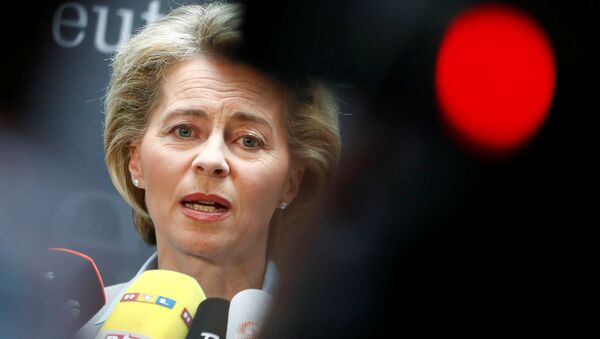Christian Schweiger, visiting professor and chair in comparative European governance systems at the Chemnitz University of Technology, expressed his doubt about von der Leyer's nomination, citing the lack of political experience on the EU level, and wondering whether her candidacy was part of a scheme masterminded by Angela Merkel.
Sputnik: Ursula von der Leyen's work as Germany’s Defence Minister received criticism from Social Democrats and members of her own party. Were you surprised when she was nominated?
Christian Schweiger: Like most people, I was very surprised to see that she was nominated. Von der Leyen does not have any political credentials on the EU level and it is obvious that her nomination is the result of a backroom deal orchestrated by Angela Merkel.
Sputnik: Her candidacy still needs to be confirmed by the parliament. Given the fact that she is criticised at home for the deteriorating state of the army and is facing an investigation in suspected misspending, how high are the chances that MEPs will approve her nomination?
Christian Schweiger: I think that it is very likely that the majority of MEPs in the European Parliament will reject her nomination. This is less because of her record as defence minister but more because she emerged from a compromise deal between Germany, France and the Visegrad countries.
Sputnik: The debates highlighted disagreements between German Chancellor Angela Merkel and French President Emmanuel Macron and their vision of the bloc. Is this an ordinary competition or are we seeing a crack in the Franco-German entente?
Christian Schweiger: The Franco-German relationship is currently in a very bad state. President Macron is obviously pretty annoyed by the fact that Merkel did hardly react to his proposals for the reform of the EU. Merkel's semi-hegemonial leadership style, which we became familiar with during the eurozone and migration crisis, has not only driven a deep wedge between Berlin and Paris. It also leaves the EU deeply divided.
Sputnik: We’ve also seen a huge rebellion even among Merkel’s closest allies when she backed socialist Frans Timmermans at the first meeting. Reports say that EEP’s designated negotiators were not informed about Merkel’s decision. Is this a sign that she is losing her authority and trust of her allies?
Christian Schweiger: Merkel is obviously in the final stages of her period in office and it could well be that she is sooner out of office than she originally thought. As pressure is mounting on her from coalition partner SPD, who is deeply alienated by the fact that she did not support Timmermans and also from the Bavarian sister party CSU, who are not happy with the fact that Manfred Weber was sidelined, she will also lose more and more of her influence in the EU.
Sputnik: Eastern European countries complained that Frans Timmermans, who was earlier proposed to head EU Commission didn't understand Europe and would divide the bloc. What about Ms. von der Leyen, can she unite Europe?
Christian Schweiger: Von der Leyen will be incapable of uniting the EU. She has no European reform credentials and nobody knows at this stage what her plan would be if she was appointed as president of the European Commission. This is why I believe that she will be rejected by the European Parliament.
Sputnik: In recent years the bloc has been criticized for ineffective response to the refugee crisis and lack of reforms. The EU has also been plagued by economic problems and Brexit. Some experts even questioned the very existence of the bloc. In your opinion can Urusla von der Leyen deal with these issues?
Christian Schweiger: The EU has a huge opportunity to regroup and reset its political and economic agenda in the face of Brexit, which is of course also a substantial risk as the EU will lose its third largest economy and an important security partner with the United Kingdom. In the past decade deep internal divisions have emerged in the EU. These can only be healed through intensive dialogue and a new consensus on the way forward. Von der Leyen is neither experienced enough nor does she have the essential connections in the EU to help to develop such a compromise agenda.
Sputnik: The agreement on nominees was dubbed hastily-stitched backroom agreement that lacked representation. Four of the five top jobs went to western Europeans. Will this worsen national divisions?
Christian Schweiger: Absolutely. It is likely to deepen the already existing substantial divisions and most of all will further undermine the credibility of the EU as the "Spitzenkandidaten" system was essentially scrapped.
Sputnik: How do you assess the candidacy of Christine Lagarde, who was chosen to lead the European Central Bank. She was investigated for abuse of authority during her tenure as French Finance Minister. Is she the right person to head ECB?
Christian Schweiger: Lagarde certainly is qualified to head the ECB. She has long-standing experience as the Managing Director of the IMF. I do not think that the former investigation still matters a lot. What is more important is that Lagarde is considered as part of the neoliberal Washington consensus, a political agenda which contributed substantially to the emergence of the global financial and the eurozone crisis. I therefore would expect a number of eurozone countries, particularly those in Southern Europe, to be pretty unhappy with her appointment at the helm of the ECB.
The views and opinions expressed by Christian Schweiger are those of the expert and do not necessarily reflect those of Sputnik.



